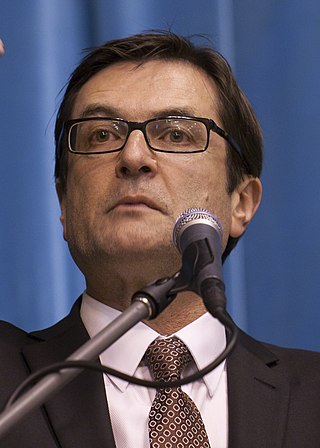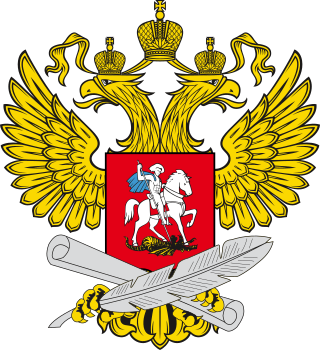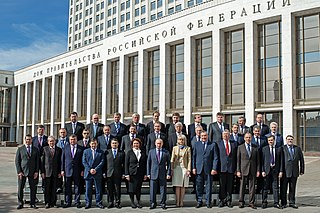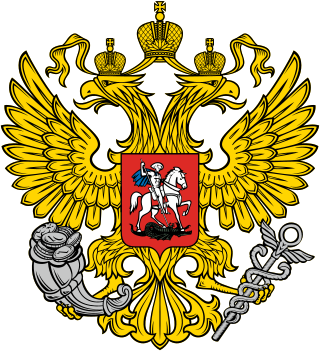
The Department of Trade and Industry (DTI) was a United Kingdom government department formed on 19 October 1970. It was replaced with the creation of the Department for Business, Enterprise and Regulatory Reform and the Department for Innovation, Universities and Skills on 28 June 2007.
The industry minister is a cabinet position in a government.
A Commerce minister is a position in many governments that is responsible for regulating external trade and promoting economic growth. In many countries, this role is separate from a finance minister, who has more budgetary responsibilities.

Gregory Ivan Combet is the chairman of Australia’s sovereign wealth fund, the Future Fund. Prior to this he served as chair of the Australian Government Net Zero Economy Agency, overseeing the economic transformation from fossil fuels to renewable energy and net zero emissions.
The Cabinet of Malaysia is the executive branch of the Government of Malaysia. Led by the Prime Minister, the cabinet is a council of ministers who are accountable collectively to the Parliament. According to the Article 43 of the Federal Constitution, members of the Cabinet can only be selected from members of either houses of Parliament. Formally, the Yang di-Pertuan Agong appoints all Ministers on the advice of the Prime Minister. The constitution is amended by repealing the Clause (8) of Article 43, enabling a person who is a member of State Legislative Assembly to continue to serve even while serving as a minister or deputy minister in the cabinet. Ministers other than the Prime Minister shall hold office during the pleasure of the Yang di-Pertuan Agong, unless the appointment of any Minister shall have been revoked by the Yang di-Pertuan Agong on the advice of the Prime Minister but any Minister may resign from office. In practice, the Yang di-Pertuan Agong is obliged to follow the advice of the Prime Minister on the appointment and dismissal of ministers.

The Ministry of Trade, Industry and Energy is a ministry under the Government of South Korea. It is concerned with regulating economic policy, especially with regard to the industrial and energy sectors. The ministry also works to encourage foreign investment in Korea.

Ministry of Education and Science of the Russian Federation existed from March 2004 till May 2018. It oversaw scientific institutions, education and school accreditation in the Russian Federation. The agency had its headquarters in Tverskoy District, Central Administrative Okrug, Moscow.
The Department of Energy was a department of the United Kingdom Government. The department was established in January 1974, when the responsibility for energy production was transferred away from the Department of Trade and Industry in the wake of the 1973 oil crisis and with the importance of North Sea oil increasing.

The Military-Industrial Commission of the Russian Federation was established by a presidential decree in March 2006. According to the decree, it is a permanently functioning body with vast responsibilities for supervising the distribution and implementation of the "State defense order". The commission answers directly to the President of Russia. It coordinates between the Defence Ministry of the Russian Federation, the Armed Forces of the Russian Federation, and the defense industry of Russia. Until then, the defense industry was supervised by Russia's Ministry of Industry and Energy, as well as by the previous government consultative body with a similar name.

The Minister for Climate Change and Energy is a portfolio in the Government of Australia. The current Minister is Chris Bowen. The minister administers his or her portfolios through the Department of Climate Change, Energy, the Environment and Water.

The structure of Government of the Russian Federation from the time the state formed in 1991 underwent several major changes. In the first years governing bodies, primarily different Ministries, were under massive reorganizations in order to adopt the older Soviet governing networks to the new form of state. Many reshufflings and renamings were made.

Vladimir Putin's Second Cabinet was a cabinet of the government of the Russian Federation following the 2008 Russian presidential election that resulted in the election of Dmitry Medvedev as the third President of Russia. The second President, Vladimir Putin, was appointed to the position of the Prime Minister of Russia. The cabinet followed Viktor Zubkov's Cabinet.

The Ministry of Industry and Tourism (MINCOTUR) is the department of the Government of Spain responsible for the proposal and execution of the government policy on industry, trade and tourism, including among its competences the industrial development and of the SMEs, the promotion and defense of the industrial property, as well as the politics of tourism and the rest of competences and attributions that the legal system attributes to it. Likewise, in coordination with the Foreign Ministry is responsible for the international cooperation on this matters.
The energy policy of the Soviet Union was an important feature of the country's planned economy from the time of Lenin onward. The Soviet Union was virtually self-sufficient in energy; major development of the energy sector started with Stalin's autarky policy of the 1920s. During the country's 70 years of existence (1922–1991), it primarily secured economic growth based on large inputs of natural resources. But by the 1960s this method had become less efficient. In contrast to other nations who shared the same experience, technological innovation was not strong enough to replace the energy sector in importance.

The Party of Business is a political party in Russia whose main goal is to promote "economic expediency". The party was founded on October 14, 2010, and officially registered on December 14, 2012. The party has described itself as "neither a right-wing nor a left-wing party" and "open to all ideas that would help us improve the social and economic situation in our country." It opposed and spoke out against the decline of Russian agriculture, and called for its revival and expansion. It also supported a reduction of the price of Russian gas and oil, and an income tax that increases based upon the average salary of Russian citizens.

The Ministry of Industry and Trade of the Russian Federation is an executive ministry of Government of Russia. Its headquarters are in Moscow.

The Ministry of Economic Development of the Russian Federation is a federal ministry in the Russian Government. The ministry is responsible for regulating and forming policies related to socioeconomic and business development in Russia.
Ministry for Atomic Energy of the Russian Federation and Federal Agency on Atomic Energy, were a Russian federal executive body from 1992–2008.

The Secretary of State for Business and Trade (Business Secretary), is a secretary of state in the Government of the United Kingdom, with responsibility for the Department for Business and Trade. The incumbent is a member of the Cabinet of the United Kingdom.















